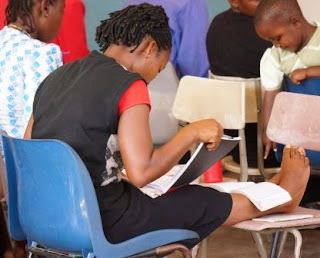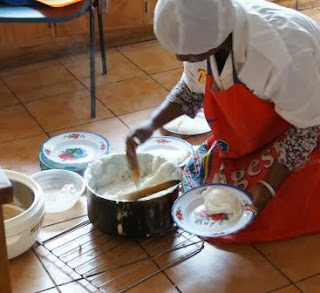 Some people have been given capital, started businesses and failed. Others had businesses that failed. Still others have started an operate successful businesses (defined as eating 2 or 3 times per day)
Some people have been given capital, started businesses and failed. Others had businesses that failed. Still others have started an operate successful businesses (defined as eating 2 or 3 times per day)One pastor runs a nursery school for 58 kids (with hired help). His wife (pictured) does -- guess what -- hair salon (how does she do that?). This is recent and they are successful.
There were three ideas I worked through as a sample business plans:
- Buy 100kg bags of maize (corn), repackaging in 1kg bags and selling at the local market for people who only have enough money to buy food for today.
- Buy 2 cases of Fanta (Ingrid's favourite), 2 cases of water and ice. Take these to the side of the road during hot season and sell them.
- Buy 300 tins of spices from Blantyre (where we are), take them to Mangochi (where we went for the weekend -- a 3 hour drive), and sell them one tin at a time at the market.

At first I thought these were all suggested just as an example. They all struck me as "lemonade stand" businesses, not something a breadwinner would even consider. Richard, you have so much to learn: these are real businesses which feed families.
Take the example of the water/Fanta. You can buy a bottle of water for 50 cents or 40 cents by the case. Fanta sells for 40 cents, you buy for 30 cents by the case (and they deliver!).
I can't remember how much ice is, but its on the order of 75 cents.
 But you need some capital: a wheelbarrow (to carry your cases to your place of doing business), a cooler and a bottle opener. We suggest a chair ("No, of course not -- we sit on a rock"), and especially a sun umbrella ("No, when we get hot, we go sit under the tree"). Ingrid said "but its the hot season, and we will be tempted to drink our inventory", but they insisted "no umbrella".
But you need some capital: a wheelbarrow (to carry your cases to your place of doing business), a cooler and a bottle opener. We suggest a chair ("No, of course not -- we sit on a rock"), and especially a sun umbrella ("No, when we get hot, we go sit under the tree"). Ingrid said "but its the hot season, and we will be tempted to drink our inventory", but they insisted "no umbrella".
It ends up that this business, though seasonal, produces about $18 profit per week on top of a salary of $10 per week. Aside from the fact that this was seasonal, the conclusion was that this was a pretty good business.
What do you say in response? I was shocked and humbled.
During the break, Simeon (a pastor who had championed the idea) came forward to talk to me. He said
"I was at home, tired of doing nothing and not providing for my family. So I said 'what can I do?'. I decided to buy one case of water and sell it by the road. After one day, I sold my case of water, so the next day, I bought 2 cases, then 3. Someone asked if I had Fanta, and I said 'No'. But then I expanded my business and sold Fanta also".
There's no doubt that this pastor's self-esteem and family's living condition improved by him selling water and Fanta. But its a huge culture shock.
 It seems that there are few people employed and so there are a myriad of was ways people earn money in small businesses: selling water by the bag (smaller and lower cost than bottled water), cooking oil (maybe 1/4 cup in a bag), mangoes (5 cents each), apples, weaving mats, making rope, roadside tailors, selling grocery bags, making gravel by chiseling large rocks into small stones (that was hard to see), women gathering sand from the river and drying it for use in concrete (also hard to see), and gathering, making and transporting charcoal. Of course there are lots more.
It seems that there are few people employed and so there are a myriad of was ways people earn money in small businesses: selling water by the bag (smaller and lower cost than bottled water), cooking oil (maybe 1/4 cup in a bag), mangoes (5 cents each), apples, weaving mats, making rope, roadside tailors, selling grocery bags, making gravel by chiseling large rocks into small stones (that was hard to see), women gathering sand from the river and drying it for use in concrete (also hard to see), and gathering, making and transporting charcoal. Of course there are lots more.
We saw lots of people with bicycles loaded with charcoal. People come from the villages where they gather wood, cut it, make charcoal, package it, and bring it to town to sell. The walk looks very difficult. Some were barefoot. Some come from 2 days walk away. And the business is illegal, so they can be stopped at any time.
I can't remember how much ice is, but its on the order of 75 cents.
 But you need some capital: a wheelbarrow (to carry your cases to your place of doing business), a cooler and a bottle opener. We suggest a chair ("No, of course not -- we sit on a rock"), and especially a sun umbrella ("No, when we get hot, we go sit under the tree"). Ingrid said "but its the hot season, and we will be tempted to drink our inventory", but they insisted "no umbrella".
But you need some capital: a wheelbarrow (to carry your cases to your place of doing business), a cooler and a bottle opener. We suggest a chair ("No, of course not -- we sit on a rock"), and especially a sun umbrella ("No, when we get hot, we go sit under the tree"). Ingrid said "but its the hot season, and we will be tempted to drink our inventory", but they insisted "no umbrella".It ends up that this business, though seasonal, produces about $18 profit per week on top of a salary of $10 per week. Aside from the fact that this was seasonal, the conclusion was that this was a pretty good business.
What do you say in response? I was shocked and humbled.
During the break, Simeon (a pastor who had championed the idea) came forward to talk to me. He said
"I was at home, tired of doing nothing and not providing for my family. So I said 'what can I do?'. I decided to buy one case of water and sell it by the road. After one day, I sold my case of water, so the next day, I bought 2 cases, then 3. Someone asked if I had Fanta, and I said 'No'. But then I expanded my business and sold Fanta also".
There's no doubt that this pastor's self-esteem and family's living condition improved by him selling water and Fanta. But its a huge culture shock.
 It seems that there are few people employed and so there are a myriad of was ways people earn money in small businesses: selling water by the bag (smaller and lower cost than bottled water), cooking oil (maybe 1/4 cup in a bag), mangoes (5 cents each), apples, weaving mats, making rope, roadside tailors, selling grocery bags, making gravel by chiseling large rocks into small stones (that was hard to see), women gathering sand from the river and drying it for use in concrete (also hard to see), and gathering, making and transporting charcoal. Of course there are lots more.
It seems that there are few people employed and so there are a myriad of was ways people earn money in small businesses: selling water by the bag (smaller and lower cost than bottled water), cooking oil (maybe 1/4 cup in a bag), mangoes (5 cents each), apples, weaving mats, making rope, roadside tailors, selling grocery bags, making gravel by chiseling large rocks into small stones (that was hard to see), women gathering sand from the river and drying it for use in concrete (also hard to see), and gathering, making and transporting charcoal. Of course there are lots more.We saw lots of people with bicycles loaded with charcoal. People come from the villages where they gather wood, cut it, make charcoal, package it, and bring it to town to sell. The walk looks very difficult. Some were barefoot. Some come from 2 days walk away. And the business is illegal, so they can be stopped at any time.














































